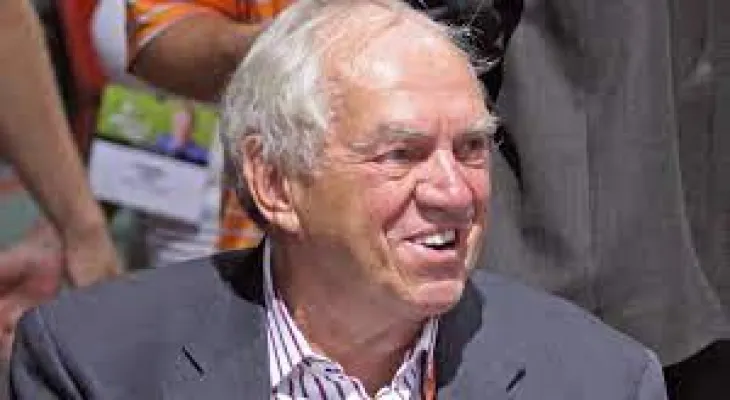Search here
Newspaper
Search here

Arab Canada News
News

Published: January 11, 2024
Ed Broadbent, longtime leader of the New Democratic Party who pushed the party to the left and to the top of the polls, has died at the age of 87.
The Broadbent Institute, which he founded, announced his death in a statement Thursday afternoon.
The statement said, "Our country has lost a fierce champion for ordinary Canadians, an intellectual who strongly believed in building a better society." "Ed dedicated decades of his life fighting for justice and equality in Canada and around the world."
John Edward Broadbent, a companion of the Order of Canada, known among New Democrats as "Honest Ed" or "Mr. Decent" or simply "Ed," led the New Democratic Party for 14 years and through four elections — and later returned to the House of Commons.
While he failed to achieve his dream of forming the official opposition, he helped over more than two decades of federal politics to establish the New Democratic Party as a viable option for voters disillusioned after years of Liberal and Conservative governments, and he was also the first New Democratic leader to see his party rise to first place in public opinion polls.
Broadbent, the second of three children, was born in Oshawa, Ontario, in 1936.
While his childhood in a union-oriented working-class city became part of the New Democratic Party tradition, his social democratic views were shaped after leaving home; his father, who worked as an employee at General Motors, and his homemaker mother were steadfast Conservative voters.
After spending time in academia, during which he wrote his doctoral thesis on the utilitarian philosopher John Stuart Mill, Broadbent began his political career with the emerging New Democratic Party in 1968 when he won the Oshawa-Whitby election, the area he represented for more than two decades.
He first ran for party leadership in the 1971 race to replace Tommy Douglas, losing to David Lewis. But he took this high office just a few years later, in 1975.
During the leadership campaign, he said, "When I say we're moving to the left, I am not personally satisfied, as a politician, with fuzzy nice generalizations. I want to think about what that means."
As leader, he emphasized economic issues, playing a crucial role during Joe Clark's minority government when his party moved a no-confidence motion that toppled the Progressive Conservative government and returned the Liberal Party under Pierre Elliott Trudeau to power.
Ignoring internal opposition after supporting Trudeau's return to the constitution, Broadbent strengthened his leadership position in the 1984 election.
After running a campaign focused on tax reforms, interest rate cuts, and equality for women, the New Democratic Party won ten seats just less than the opposing Liberals.
Following the election, Broadbent rode a wave of popularity in the mid-1980s, consistently leading Liberal leader John Turner and Prime Minister Brian Mulroney in opinion polls.
As a measure of his popularity, Chatelaine magazine ranked him one of the ten most attractive men in Canada. His wife, Lucille Broadbent, laughing at the time, said, "There are many good things I can call Ed. But sexy? No."
In the 1988 election—a bitter campaign revolving around the Free Trade Agreement—the party pushed to the brink of a breakthrough by winning 43 seats. This made Broadbent the most successful leader in the New Democratic Party's history — a title he held until Jack Layton's "orange wave" in 2011.
But after setting his sights on leading the official opposition, Broadbent was candid about his feeling of disappointment. He resigned as leader in 1989.
In his emotional resignation speech to his supporters, he urged the party to find someone new "to take us the next step toward building the decent, exciting, and compassionate Canada we all believe in."
During that hour-long speech, he addressed a growing debate among New Democrats over tensions between party principles and the pursuit of power.
He said that a strict commitment to principles can be "narcissistic self-indulgence."
"Chasing power only means denying the reason for our existence."
After leaving politics, Broadbent served as director of the International Centre for Human Rights and Democratic Development from 1990 to 1996. He remained engaged in local issues, including a campaign to eradicate child poverty.
But Broadbent continued to question a final return to politics. He once suggested that playing for the Blue Jays would be more likely.
But he couldn't stay away forever.
More than a decade after his departure, he was enticed back by then-New Democratic Party leader Jack Layton in 2004. He reintroduced himself to a new generation of voters through a rap video titled "Ed's Back."
He went on to win an Ottawa seat in the 2004 election. He did not seek re-election due to his wife's deteriorating health. Lucille Broadbent, whom Ed described as the love of his life, died of breast cancer in 2006.
He remained a respected statesman within the New Democratic Party and helped former Prime Minister Jean Chrétien negotiate the official coalition agreement between the Liberals and the New Democratic Party to replace Stephen Harper's Conservative government in 2008; coalition talks fell through after Governor General Michaëlle Jean prorogued Parliament at Harper's request in December 2008.
During his second stint outside politics, he helped establish a political think tank — the Broadbent Institute — to study social democratic issues.
He said, "Our founder [Tommy Douglas] understood well that a movement or political idea does not live in the past."
"There is a lot of pressure on politicians... to win the next battle in two months instead of building Canada after five or ten years. So other institutions besides the party must come and provide that."
Comments